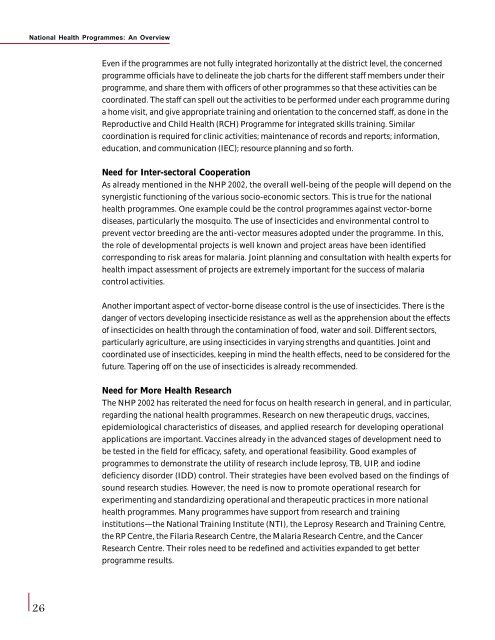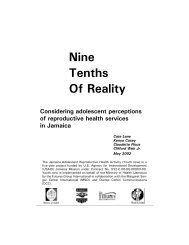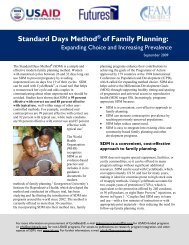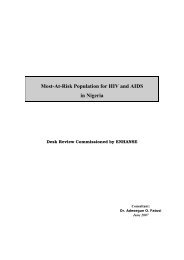Health Policy Issues and Health Programmes in ... - Amazon S3
Health Policy Issues and Health Programmes in ... - Amazon S3
Health Policy Issues and Health Programmes in ... - Amazon S3
- No tags were found...
Create successful ePaper yourself
Turn your PDF publications into a flip-book with our unique Google optimized e-Paper software.
National <strong>Health</strong> <strong>Programmes</strong>: An OverviewEven if the programmes are not fully <strong>in</strong>tegrated horizontally at the district level, the concernedprogramme officials have to del<strong>in</strong>eate the job charts for the different staff members under theirprogramme, <strong>and</strong> share them with officers of other programmes so that these activities can becoord<strong>in</strong>ated. The staff can spell out the activities to be performed under each programme dur<strong>in</strong>ga home visit, <strong>and</strong> give appropriate tra<strong>in</strong><strong>in</strong>g <strong>and</strong> orientation to the concerned staff, as done <strong>in</strong> theReproductive <strong>and</strong> Child <strong>Health</strong> (RCH) Programme for <strong>in</strong>tegrated skills tra<strong>in</strong><strong>in</strong>g. Similarcoord<strong>in</strong>ation is required for cl<strong>in</strong>ic activities; ma<strong>in</strong>tenance of records <strong>and</strong> reports; <strong>in</strong>formation,education, <strong>and</strong> communication (IEC); resource plann<strong>in</strong>g <strong>and</strong> so forth.Need for Inter-sectoral CooperationAs already mentioned <strong>in</strong> the NHP 2002, the overall well-be<strong>in</strong>g of the people will depend on thesynergistic function<strong>in</strong>g of the various socio-economic sectors. This is true for the nationalhealth programmes. One example could be the control programmes aga<strong>in</strong>st vector-bornediseases, particularly the mosquito. The use of <strong>in</strong>secticides <strong>and</strong> environmental control toprevent vector breed<strong>in</strong>g are the anti-vector measures adopted under the programme. In this,the role of developmental projects is well known <strong>and</strong> project areas have been identifiedcorrespond<strong>in</strong>g to risk areas for malaria. Jo<strong>in</strong>t plann<strong>in</strong>g <strong>and</strong> consultation with health experts forhealth impact assessment of projects are extremely important for the success of malariacontrol activities.Another important aspect of vector-borne disease control is the use of <strong>in</strong>secticides. There is thedanger of vectors develop<strong>in</strong>g <strong>in</strong>secticide resistance as well as the apprehension about the effectsof <strong>in</strong>secticides on health through the contam<strong>in</strong>ation of food, water <strong>and</strong> soil. Different sectors,particularly agriculture, are us<strong>in</strong>g <strong>in</strong>secticides <strong>in</strong> vary<strong>in</strong>g strengths <strong>and</strong> quantities. Jo<strong>in</strong>t <strong>and</strong>coord<strong>in</strong>ated use of <strong>in</strong>secticides, keep<strong>in</strong>g <strong>in</strong> m<strong>in</strong>d the health effects, need to be considered for thefuture. Taper<strong>in</strong>g off on the use of <strong>in</strong>secticides is already recommended.Need for More <strong>Health</strong> ResearchThe NHP 2002 has reiterated the need for focus on health research <strong>in</strong> general, <strong>and</strong> <strong>in</strong> particular,regard<strong>in</strong>g the national health programmes. Research on new therapeutic drugs, vacc<strong>in</strong>es,epidemiological characteristics of diseases, <strong>and</strong> applied research for develop<strong>in</strong>g operationalapplications are important. Vacc<strong>in</strong>es already <strong>in</strong> the advanced stages of development need tobe tested <strong>in</strong> the field for efficacy, safety, <strong>and</strong> operational feasibility. Good examples ofprogrammes to demonstrate the utility of research <strong>in</strong>clude leprosy, TB, UIP, <strong>and</strong> iod<strong>in</strong>edeficiency disorder (IDD) control. Their strategies have been evolved based on the f<strong>in</strong>d<strong>in</strong>gs ofsound research studies. However, the need is now to promote operational research forexperiment<strong>in</strong>g <strong>and</strong> st<strong>and</strong>ardiz<strong>in</strong>g operational <strong>and</strong> therapeutic practices <strong>in</strong> more nationalhealth programmes. Many programmes have support from research <strong>and</strong> tra<strong>in</strong><strong>in</strong>g<strong>in</strong>stitutions—the National Tra<strong>in</strong><strong>in</strong>g Institute (NTI), the Leprosy Research <strong>and</strong> Tra<strong>in</strong><strong>in</strong>g Centre,the RP Centre, the Filaria Research Centre, the Malaria Research Centre, <strong>and</strong> the CancerResearch Centre. Their roles need to be redef<strong>in</strong>ed <strong>and</strong> activities exp<strong>and</strong>ed to get betterprogramme results.26







